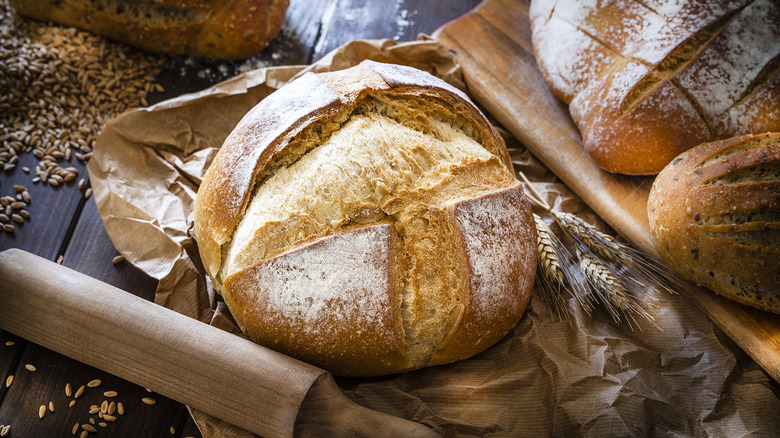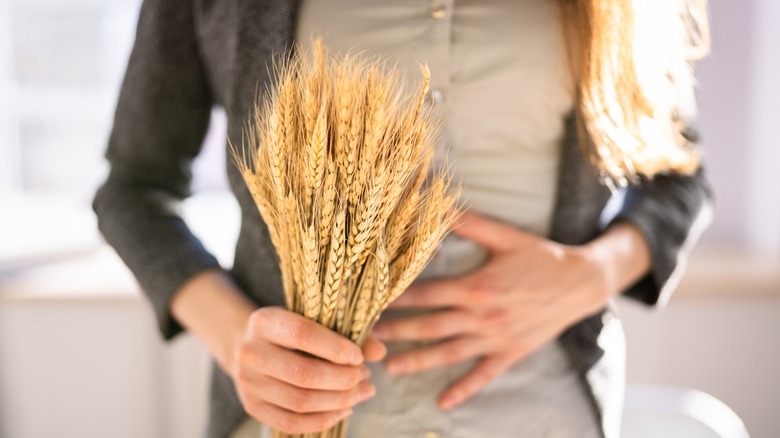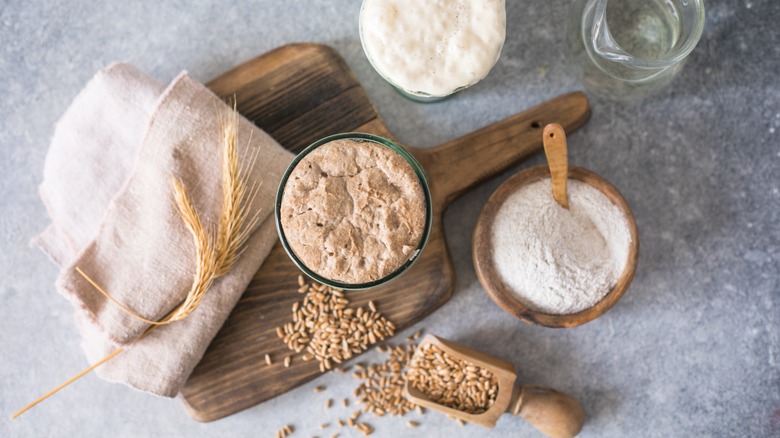Does Sourdough Bread Contain Gluten (And Why It's Good For Sensitive Stomachs)
Sourdough bread made from wheat contains gluten. Full stop. Certain fermentation methods, however, can make that gluten much more digestible. Sourdough starters work by leveraging natural, wild yeasts to make bread rise, but yeast isn't the only living thing inside. These starters also contains various kinds of bacteria, particularly types of lactobacillus.
You might know lactobacillus as a common probiotic or from certain kinds of pickles; it's a strain of bacteria that ferments all sorts of tasty foods, including sourdough bread. A 2004 study published in the journal Applied and Environmental Microbiology showed that sourdough starters containing certain lactobacilli bacteria have a markedly different effect on (admittedly, a small test group of) people with celiac disease than bread made with conventional yeast. Researchers made a loaf of bread using a mixture of non-glutenous flour, 30% wheat flour, and a sourdough starter containing certain lactobacillus bacteria; they found that, with a 24-hour fermentation period, the patients' digestive systems barely reacted. Because of the way the lactobacilli broke down the gluten, the sourdough was much easier on their stomachs.
That said, people have wheat sensitivities for many reasons, and sourdough may not make wheat bread accessible to everyone. For those with gluten sensitivities, however, the combination of a long fermentation time and the presence of certain lactobacilli may make wheat bread more digestible.
Why might people with gluten intolerances be able to digest sourdough?
Gluten is a complex protein molecule. Although people generally use one consistent term to describe the molecule, gluten can contain a ton of variability. In fact, it's more of an umbrella term for any combination of proteins found in wheat that interact in different ways. Two of its primary proteins are gliadin and glutenin.
Human intestines — even in people who aren't allergic to gluten — generally can't absorb proteins with more than four amino acids. Intestinal enzymes struggle to break down gliadin this far, but even so, the protein can somehow still enter the intestine and bind with cells. For those without gluten intolerances, this isn't a big deal. For those with gluten intolerances, it is — their immune system identifies these gliadin chains as enemy invaders and attacks them, killing the cells they're bound to in the process. But these attacking white blood cells (lymphocytes) are seeking out longer chains; if the gliadin proteins are broken down, the lymphocytes can't find them.
This is where the sourdough fermentation process comes into play. According to the 2004 study, certain bacteria found in some sourdough starters (like lactobacillus) can break down the gliadin during the dough-proofing process — before it ever enters the digestive system. This is why people with gluten sensitivities may be able to digest sourdough made with these starters, but not other kinds of wheat bread.
Each starter comes with many variables
Every sourdough starter is unique and incredibly dependent on its environment. This is why sourdough tastes different from place to place. The microbiome of cultures is still the subject of much research; although the 2004 study identified four lactobacilli particularly adept at breaking down the proteins responsible for gluten intolerance — L. alimentarius, L. brevis, L. sanfranciscensis, and L. hilgardii — these don't exist in a vacuum, especially in starters.
The length of fermentation can vary between people and starters, generally ranging from 12 hours all the way to 48 hours. According to Vanessa Kimbell, who runs The Sourdough School in Northamptonshire, U.K., one of her colleagues has colitis and can't digest sourdough unless it's been fermented for 36 hours (per Bon Appétit).
Of course, the flour matters, too. Certain breeds of wheat contain more or less protein (gliadin and glutenin) than others and in different combinations. Even so, growing seasons also affect gluten's development. Katharine Schert, a researcher and professor at the Karlsruhe Institute of Technology in Germany, told Science Daily that precipitation has a strong influence on protein composition. So, even if you find a flour, a starter, and a fermentation length that work for you now, these could change with the seasons.


